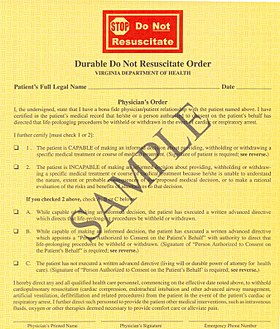| Do not resuscitate | |
|---|---|
 DNR form used in Virginia | |
| Other names | Do not attempt resuscitation, allow natural death, no code, do not attempt cardiopulmonary resuscitation,[1][2] do not attempt resuscitation, no CPR, not for resuscitation, not to be resuscitated |
A do-not-resuscitate order (DNR), also known as Do Not Attempt Resuscitation (DNAR), Do Not Attempt Cardiopulmonary Resuscitation (DNACPR[3]), no code[4][5] or allow natural death, is a medical order, written or oral depending on the jurisdiction, indicating that a person should not receive cardiopulmonary resuscitation (CPR) if that person's heart stops beating.[5] Sometimes these decisions and the relevant documents also encompass decisions around other critical or life-prolonging medical interventions.[6] The legal status and processes surrounding DNR orders vary in different polities. Most commonly, the order is placed by a physician based on a combination of medical judgement and patient involvement.[7]
- ^ 4
- ^ 5
- ^ "Do not attempt cardiopulmonary resuscitation (DNACPR) decisions". nhs.uk. 2021-03-10. Retrieved 2021-09-15.
- ^ Cite error: The named reference
:2was invoked but never defined (see the help page). - ^ a b "Do-not-resuscitate order: MedlinePlus Medical Encyclopedia". medlineplus.gov. Retrieved 2019-05-29.
- ^ Richardson DK, Zive D, Daya M, Newgard CD (April 2013). "The impact of early do not resuscitate (DNR) orders on patient care and outcomes following resuscitation from out of hospital cardiac arrest". Resuscitation. 84 (4): 483–7. doi:10.1016/j.resuscitation.2012.08.327. PMID 22940596.
- ^ Santonocito C, Ristagno G, Gullo A, Weil MH (February 2013). "Do-not-resuscitate order: a view throughout the world". Journal of Critical Care. 28 (1): 14–21. doi:10.1016/j.jcrc.2012.07.005. PMID 22981534.